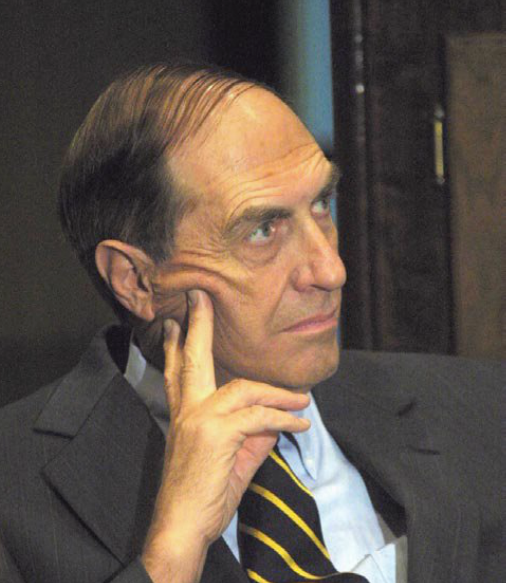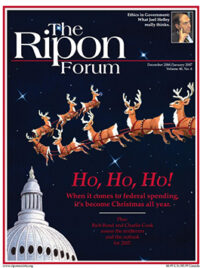After twelve years, the tide of power turned this November. Great responsibility comes with power, and we will soon be witness to that power in the 110th Congress.
Knowing that Congress is an institution, we can find comfort in the fact that faces may change but purpose remains. During the years, we as elected officials represent our home districts, our people and our values. We hold ourselves to higher standards because we have been given the power to change law, to create law, and to fund our government. And when those standards weaken in the House, we monitor each other through the use of the Ethics Committee.
Since its inception in 1968, the Committee on Standards for Official Conduct (informally known as the House Ethics Committee) has been unique in the House of Representatives. It is the only standing committee in which membership is equally divided between each party. The make-up of the committee is intended to provide a fair procedural framework for the conduct of the committee’s activities and to help ensure that the committee serves well the people of the United States, the House of Representatives, and the members, officers and employees of the House.

I have been in the unique position of serving on the Ethics Committee as a member and as Chairman. During my service, I have come to the conclusion that the process works if Leadership allows it to. Having an equally divided committee fosters a working relationship that has rarely been equaled on other committees. In my time as Chairman, no decision was made on a partisan basis, and most decisions were unanimous. I would be hard pressed to remember a time when Congress was not under scrutiny, but in recent times we have come under a direct dissection and search for credibility. To be a credible ethics process, bipartisanship must exist not only in Committee deliberations and actions, but also in the development of the rules under which those deliberations and actions will occur.
I believe some of our credibility disappeared in late 2004 and early 2005 when Leadership fast-tracked legislation, calling on party loyalty to pass the rules changes. This is a misfortune that should be remedied in the 110th Congress. The vote on the ethics process should be separate and apart from the vote on the House rules. The vote on House rules is a party-line vote, but the vote on the ethics process should not be. The January 2005 vote signified a major detour from a bipartisan ethics resolution.
To be a credible ethics process, bipartisanship must exist not only in Committee deliberations and actions, but also in the development of the rules under which those deliberations and actions will occur.
Besides the actual rule changes, I am troubled by the actual process Leadership engaged in to fast track the rules changes. Despite numerous requests by the committee, Leadership did not consult the committee on any of the changes they proposed and publicly released the text of these rules only a few hours before they were to be voted upon. The Ethics Committee has almost 40 years of bipartisan tradition. From its very beginning, the rules for its operation were the results of a bipartisan panel composed of six Democrats and six Republicans. To continue working without undue influence, it is imperative to develop the rules in a bipartisan manner.
Past evidence reveals the chair and ranking member would submit changes to the ethics rules when the process stopped working. By submitting changes, the committee commits to three things: bipartisanship, careful deliberation, and a showing of necessity. Through change, we strive to strengthen the ethics rules. From 1997, when I served my first term, until 2004, while serving my last, we as a committee gave unanimous or overwhelmingly bipartisan conclusions. The committee, as part of the institution, worked. Deadlock never reared its ugly head. Partisanship was left at the door. And careful deliberation carried us to our conclusions.
In the end, it is the independent nature of the Ethics Committee that will sustain change and provide oversight to the standards necessary for an institution worthy of respect.
The importance of the Ethics process for the new Congress will redefine the character of Congress. We have the duty to protect the institution Congress represents, and within that duty, we must hold ourselves accountable for our own actions as well as our colleagues’ actions. I would suggest that if Chairman Hastings goes on to other things, the new Minority Leader of the House should appoint Representative Kenny Hulshof (R-MO) to be the ranking member of the Ethics Committee. Hulshof, in my opinion, represents a proven option to lead the committee. He has proven to be nonpartisan and holds the respect of everyone. If there is any committee on the Hill that should aspire to non-partisanship and respect, it is the Ethics Committee. The Ethics Committee can continue to produce fair decisions so long as Leadership stays out of the process.
As I face the last days of service here in the House, I urge those returning and those just chosen to use a different process than used in January 2005 to adopt the new ethics rules for the House. We have done a great disservice to ourselves by voting for partisanship in the ethics process, and the consequences of that vote show in the form of stalemate during most of the last Congress. It is my hope that a real analysis of the rules is undertaken when deciding on changes. Based on my experience on the Ethics Committee, I, along with Representative Hulshof, have suggested reforms to the House ethics procedure that were not included in H.R. 4975, the bill which passed the House. Our bill, H.R. 4988, does three things the passed legislation does not. Our bill gives the Ethics Committee broader subpoena power during informal investigations, which is when the key decision is made whether to fully investigate a potential violation. Our bill would strengthen the independence of the chair and ranking Member by giving them presumptive six year terms like other Chairmen. And our bill would strengthen the independence of the Ethics Committee staff by making this a career office, like the Parliamentarian’s office, yet with the accountability all staff should have.
In the end, it is the independent nature of the Ethics Committee that will sustain change and provide oversight to the standards necessary for an institution worthy of respect. The Ethics process sets the tone.
Joel Hefley has represented the Fifth District of Colorado in the U.S. House of Representatives since 1987. From 2001 until 2005, he served as Chairman of the Ethics Committee. He is retiring at the end of this term.





